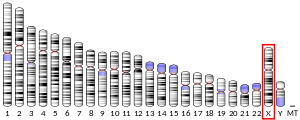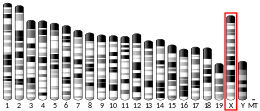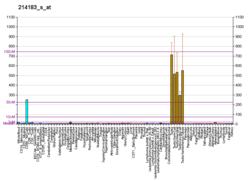Further reading
- Hartley JL, Temple GF, Brasch MA (2001). "DNA Cloning Using In Vitro Site-Specific Recombination". Genome Res. 10 (11): 1788–95. doi:10.1101/gr.143000. PMC 310948. PMID 11076863.
- Simpson JC, Wellenreuther R, Poustka A, et al. (2001). "Systematic subcellular localization of novel proteins identified by large-scale cDNA sequencing". EMBO Rep. 1 (3): 287–92. doi:10.1093/embo-reports/kvd058. PMC 1083732. PMID 11256614.
- Strausberg RL, Feingold EA, Grouse LH, et al. (2003). "Generation and initial analysis of more than 15,000 full-length human and mouse cDNA sequences". Proc. Natl. Acad. Sci. U.S.A. 99 (26): 16899–903. doi:10.1073/pnas.242603899. PMC 139241. PMID 12477932.
- Gerhard DS, Wagner L, Feingold EA, et al. (2004). "The Status, Quality, and Expansion of the NIH Full-Length cDNA Project: The Mammalian Gene Collection (MGC)". Genome Res. 14 (10B): 2121–7. doi:10.1101/gr.2596504. PMC 528928. PMID 15489334.
- Wiemann S, Arlt D, Huber W, et al. (2004). "From ORFeome to Biology: A Functional Genomics Pipeline". Genome Res. 14 (10B): 2136–44. doi:10.1101/gr.2576704. PMC 528930. PMID 15489336.
- Ross MT, Grafham DV, Coffey AJ, et al. (2005). "The DNA sequence of the human X chromosome". Nature. 434 (7031): 325–37. doi:10.1038/nature03440. PMC 2665286. PMID 15772651.
- Coy JF, Dressler D, Wilde J, Schubert P (2005). "Mutations in the transketolase-like gene TKTL1: clinical implications for neurodegenerative diseases, diabetes and cancer". Clin. Lab. 51 (5–6): 257–73. PMID 15991799.
- Mehrle A, Rosenfelder H, Schupp I, et al. (2006). "The LIFEdb database in 2006". Nucleic Acids Res. 34 (Database issue): D415–8. doi:10.1093/nar/gkj139. PMC 1347501. PMID 16381901.
- Langbein S, Zerilli M, Zur Hausen A, et al. (2006). "Expression of transketolase TKTL1 predicts colon and urothelial cancer patient survival: Warburg effect reinterpreted". Br. J. Cancer. 94 (4): 578–85. doi:10.1038/sj.bjc.6602962. PMC 2361175. PMID 16465194.
- Staiger WI, Coy JF, Grobholz R, et al. (2007). "Expression of the mutated transketolase TKTL1, a molecular marker in gastric cancer". Oncol. Rep. 16 (4): 657–61. doi:10.3892/or.16.4.657. PMID 16969476.
- Zhang S, Yang JH, Guo CK, Cai PC (2007). "Gene silencing of TKTL1 by RNAi inhibits cell proliferation in human hepatoma cells". Cancer Lett. 253 (1): 108–14. doi:10.1016/j.canlet.2007.01.010. PMID 17321041.





